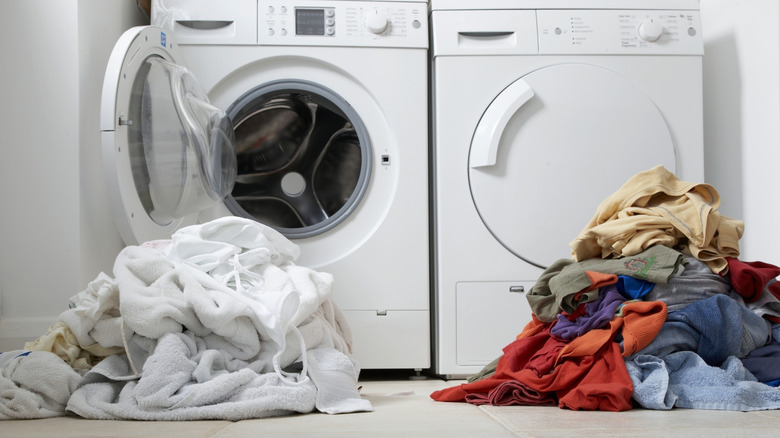The Best Wash Cycle For Fresh & Long-Lasting Clothes, According To An Expert
We may receive a commission on purchases made from links.
Have you ever had clothes looking a little worse for wear after a wash? Or, perhaps they developed a musty odor and shattered your dreams of sniffing fresh-smelling laundry? Now, before you put the blame on your "obviously low-quality" garments and good-for-nothing detergent, know that the fault may lie with your washer. More specifically, the wash cycle you choose. Laundering your precious items more often than recommended (your jeans can survive up to 10 wears without being washed) will also compromise the longevity of your clothes. However, you can hardly wear dirty shirts, dresses, and trousers to the office. To help you find the right balance and choose the best wash cycle, House Digest reached out to Tom Ceconi, president at Heritage Park Laundry Essentials, for an exclusive interview. His advice? Most pieces fare well in a cool to warm water cycle.
But that doesn't mean you should subject your garments to repeated washings. Weighing the pros and cons of frequently laundering your garments, Ceconi says, "Let's begin with the upside: multiple washings are great for making items like jeans feel softer and "broken in" and for softening cotton shirts like T-shirts and flannels." But don't subscribe to this idea without being aware of the risks. "That said, repeated washing will definitely break down clothing — especially lighter-weight garments — and cause damage like pilling, wear, fading, and sometimes tearing at the seams." To ensure your pieces don't look like they lost a fight with a heavyweight champion, he recommends sorting your laundry into separate piles and washing the more delicate pieces in dedicated mesh bags. Additionally, try air drying your laundry or pick the lowest heat setting.
The best wash cycle for fresh and long-lasting clothes
To ensure your washer doesn't shave years off your dirty garments, don't skip an important step before starting a load of laundry. Always go through the care label so your clothes don't shrink, fade, or look worn out after a wash. Ceconi agrees and shares with House Digest exclusively, "... Read and follow the care guidelines for whatever you are laundering." But if the label is hardly legible anymore or doesn't provide much insight, our expert has a few tips up his sleeve. "That said, my advice is to wash heavier items like towels, sweatshirts, and denim in a normal cycle in cool to warm water; most apparel in a light to normal cycle in cool to warm water; and delicate items and washable silk and wool on a gentle/delicate/handwash cycle in cold to cool water."
In short, "... when it comes to protecting fabric, less heat and less friction is definitely better," Ceconi says. Basically, a gentler cycle will protect your garments against early wear and tear. "My only caveat is that some detergents perform at their maximum capacity in warm water," Ceconi notes, so take that into account before you select a wash cycle. Additionally, you'll want to shy away from running hot water cycles unless your pieces smell malodorous. "Hot water is generally not necessary unless you are sanitizing and/or removing stains," says Ceconi. Another tip to keep your laundry smelling fresh is to maintain a clean washing machine. Ceconi concurs, "Also, keep your machine clean, especially if it is a front-loader that tends to grow musty (a smell which can transfer to your laundry and is most unpleasant)."
Laundry tips to help prolong your clothes' freshness and longevity
To keep your clothes' freshness and lifespan intact, Ceconi shares his favorite tips in a House Digest exclusive. "First, your laundry should be sorted by color, fabric, and weight." It'll prevent color bleeding, minimize lint on your clothes, and ensure they don't experience unnecessary friction. To that end, wash certain items on their own. "Towels, for example, should be sorted by color and laundered in a separate load." Additionally, wash your kitchen and bath towels separately to minimize cross-contamination. If this isn't feasible, you can consider a few tips to get your kitchen and bath towels clean together, including pre-treating grease stains on kitchen towels first and choosing the right detergent. Ceconi continues, "Sheets should always be washed together. Launder specialty items like performance/athletic wear in their own load."
For less hardy pieces, Ceconi says, "Delicate items (including lingerie and swimwear) should also be washed in a dedicated load." Muchfun's 3 Piece Honeycomb Mesh Laundry Bags for Delicates will keep the hooks and clasps firmly attached and prevent the pieces from getting damaged or lost. Moreover, always ensure you don't overload your washer. "It is better to do more loads and ensure they are thoroughly rinsed," Ceconi recommends. Further, don't rely on bleach to soften your garments. Fabric softener and dryer sheets will also leave behind a waxy layer. Ceconi says, "For general softening of clothing, toss a couple of organic wool dryer balls in the dryer to soften and speed up dry time." Finally, he advises picking the right detergent and "dry[ing] most laundry on the lowest heat for the shortest amount of time possible." You can air-dry your delicate and embellished pieces to elongate their life.


